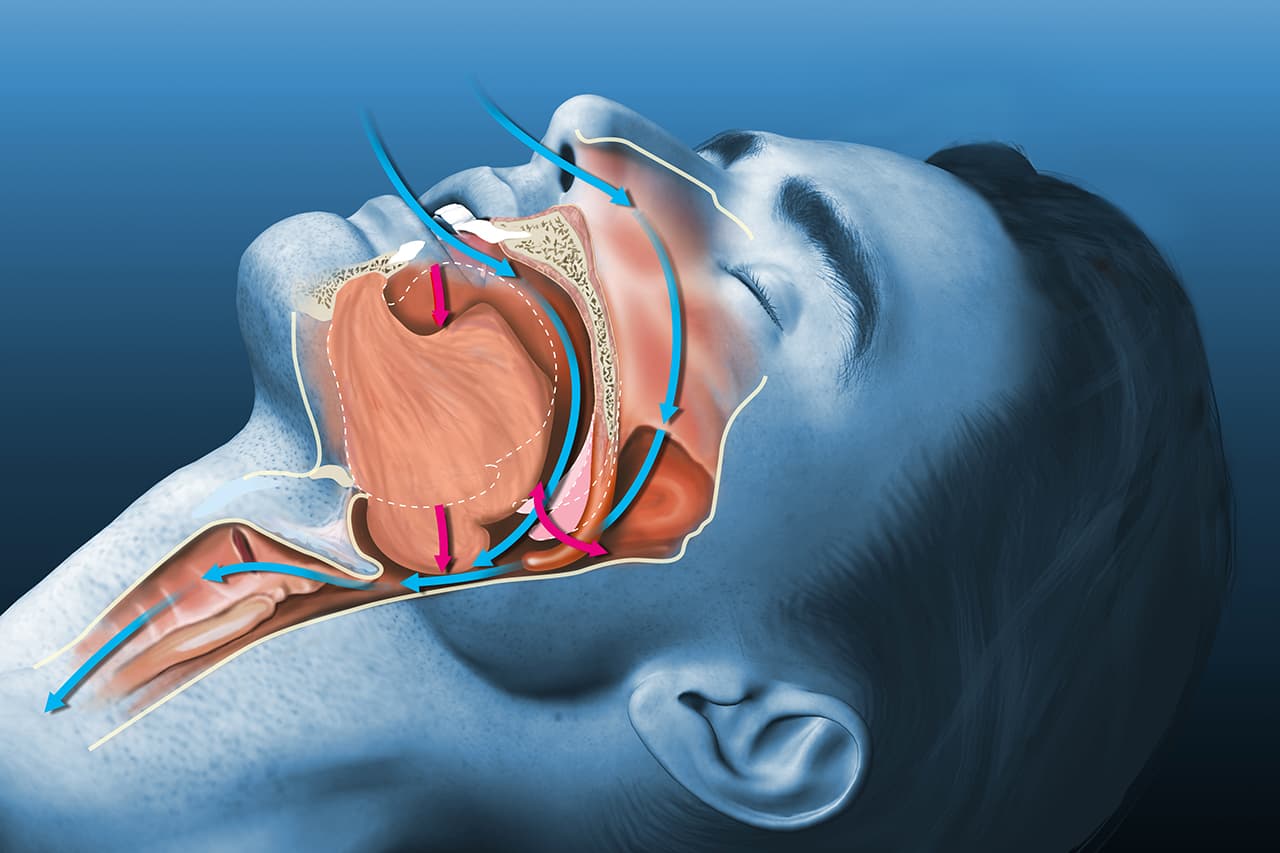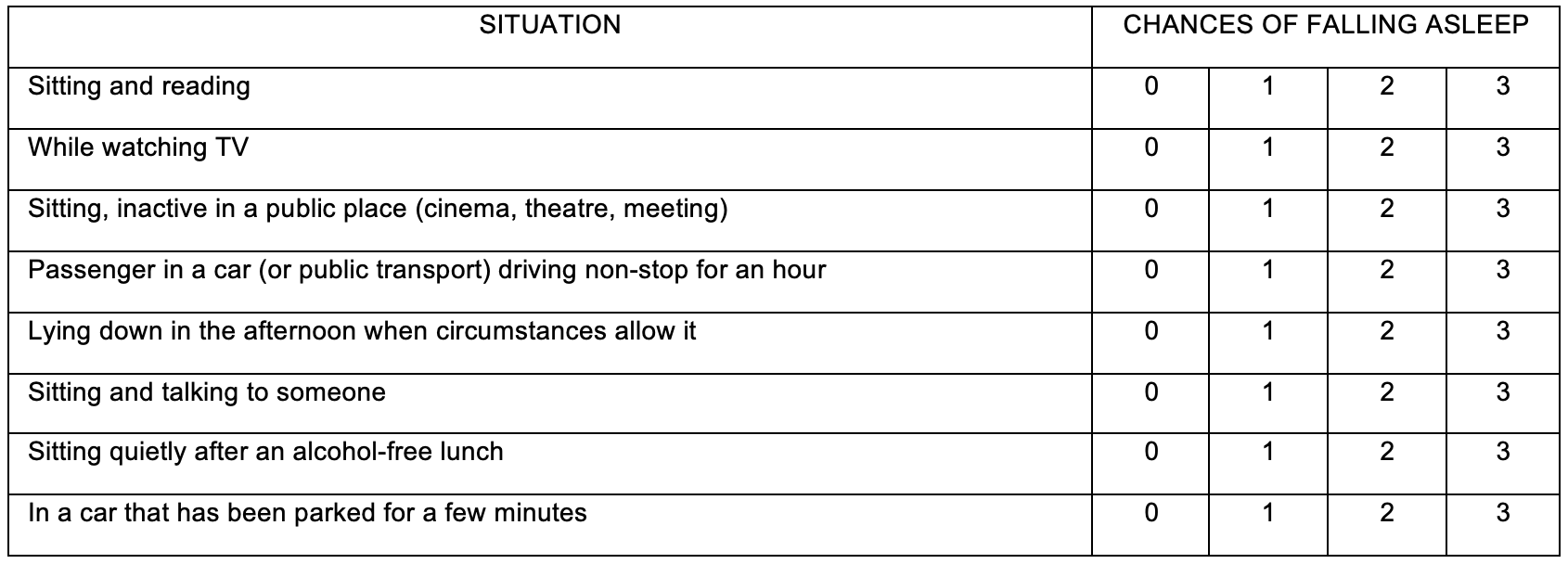Snoring and sleep apnea assessment
Why?
- If your own snoring bothers you.
- If your snoring creates tension in your relationship.
- If your partner hears your breathing pause momentarily while you sleep.
- If you feel very tired during the day, even though your nights’ sleep is quite long.
- If you fall asleep at the cinema, in front of the TV, in meetings or even in the car at stoplights.
- If you have a headache, especially in the morning, for no other reason.
- If you have to get up several times a night to urinate without having a prostate or prostate problem (high nocturia).
- If your libido drops without explanation.
- If your child snores loudly, especially if he or she pauses for breath while sleeping.
Where and how?
In the consultation room for the interview. At home for nocturnal polygraphy. At the clinic or hospital for polysomnography.
Snoring assessment may involve several stages:
- The interview specifies weight and height, symptoms (see above) and impact using the epworth questionnaire (below).
- The clinical examination directly explores the nose, mouth and throat using a nasofibroscope in different positions (seated, then lying down), with voluntary inspiration with mouth and nose occluded.
- Nocturnal polygraphy is a recording of parameters during night-time sleep: sleep duration, heart rate, respiratory frequency, total or partial respiratory pauses (apneas, hypopneas), number-duration-loudness of snoring, blood oxygen saturation or oximetry (through the skin),
- Polysomnography in a hospital or clinic. This is a nocturnal polygraph to which an EMG (electromyogram), EEG (electroencephalogram), EOG (electro-oculogram) and sometimes other parameters (temperature, oesophageal pressure, etc.) are added.
- Artificial sleep endoscopy in the operating room in some centers.

For whom?
Snoring is the emission of noises from the mouth during sleep.
Anything that involves the need to open the mouth to breathe while sleeping can result in snoring. There are many causes of nasal breathing obstruction (allergic or non-allergic rhinitis, deviated septum (lien avec septoplastie), enlarged vegetations (lien avec adénoïdectomie) and not all of them require surgery.
Other causes of snoring are pharyngeal (long soft palate, long and massive uvula, tonsillar hypertrophy), lingual (tongue hypertrophy) or bony, with the lower jaw too far back (retrognathia)..
Factors that contribute to snoring include being overweight, drinking alcohol in the evening, and treatments that cause the tongue and veils to relax during sleep (sleeping pills, hypnotics, muscle relaxants, older-generation antihistamines).
Obstructive sleep apnea (OSA) is characterized by respiratory arrest due to obstruction caused by the collapse of the oropharyngeal walls, which is linked to a sleep-induced drop in muscle tone. This phenomenon only affects certain people with an anatomical predisposition to this collapse. Respiratory arrest causes a slowing of the heart rate and a drop in oxygen levels in the blood, which can have serious long-term repercussions if repeated: high blood pressure, cardiovascular diseases such as heart attacks, vascular accidents.
ADULTS: Snorers and/or apneics who are overweight, drink alcohol in the evening, take sleeping pills, hypnotics, muscle relaxants, old-generation antihistamines, with unfavorable anatomy: retrognathia, massive tongue base, long soft soft palate, large tonsils, obstructive vegetations, deviated nasal septum, allergic or non-allergic rhinitis, nasosinus polyposis.
CHILDREN: Snoring and/or apnea with large tonsils or obstructive vegetations are the most frequent causes. But snoring alone, with no other repercussions, is not an indication for surgery.
(lien amygdalectomie) (lien adénoidectomie).
EPWORTH sleep debt questionnaire
To answer, use the following scale, circling the most appropriate number for each situation.
0 = no chance of dozing or falling asleep
1 = low chance of falling asleep
2 = medium chance of falling asleep
3 = high chance of falling asleep

- Less than 8 points : You have no sleep debt.
- From 9 to 14: You have a sleep debt.
- More than 15: You are subject to excessive daytime sleepiness.
Complementary assessment
In addition to the assessment described above, your ENT specialist may decide to carry out the following procedures, depending on the case :
- Cardiological examination.
- Sinus CT scan.
- A blood biology test that varies according to the medical context.
ENT consultation for a snoring and sleep apnoea check-up in La Roche-sur-Yon, Vendée
Dr Antoine Delagranda is available to answer any questions you may have about snoring and sleep apnoea. Dr Delagranda is a specialist in ENT surgery at the Clinique Saint Charles in La Roche-sur-Yon in the Vendée.

